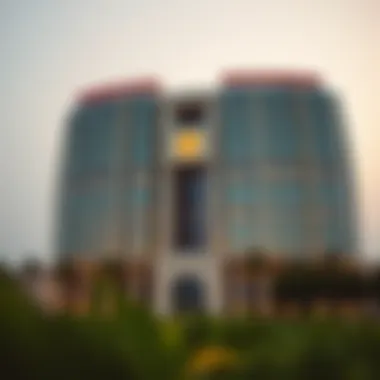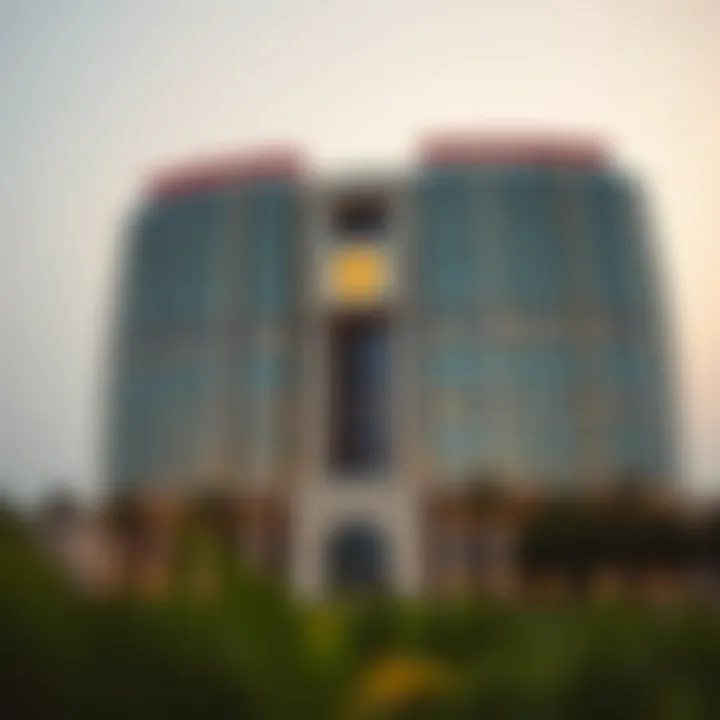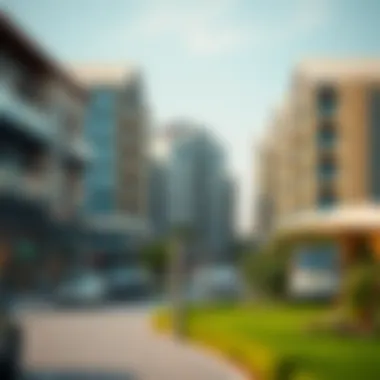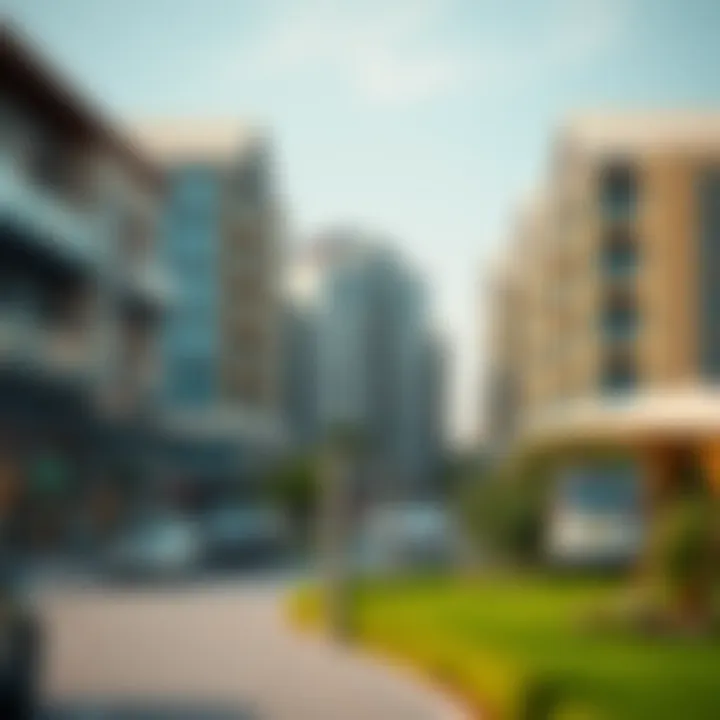Significant Real Estate Developments in the Emirates


Intro
The landscape of real estate in the Emirates is a tapestry woven with ambition, innovation, and significant economic undertones. Both Dubai and Abu Dhabi stand as beacons of forward-thinking developments that shape the future of urban living. What once was a stretch of desert has evolved into a dynamic hub for luxury, leisure, and cutting-edge infrastructure.
Investing in real estate here is not just a financial decision; it’s stepping into a vibrant community that is constantly evolving. Navigating this space requires a thoughtful understanding of current trends, the market's pulse, and the factors that come into play.
In this exploration, we will unpack the key points of substantial projects, the investment opportunities that beckon, and the market insights that guide potential buyers, investors, and savvy real estate agents. Prepare to dive deep into the thriving real estate markets of the Emirates, where opportunities abound, and visions of tomorrow are realized today.
Market Insights
Current Market Trends
As we step into the heart of the Emirates real estate market, it becomes clear that trends reflect both global and local influences. In a nutshell, the market has shown resilience and adaptability, responding to the fluctuating demands of both local residents and expatriates. High-end developments continue to push the envelope with state-of-the-art amenities, while mixed-use communities are gaining traction.
The appetite for luxury remains insatiable, driven by affluent buyers looking for exclusive properties. Meanwhile, affordability also plays a crucial role, with developers creating budget-friendly options to cater to first-time homebuyers. Overall, a blend of luxury and accessibility is paving the way forward.
Economic Factors Influencing Prices
Several economic factors are influencing property prices in the Emirates. According to market analysts, economic diversification, along with government initiatives aimed at boosting tourism and foreign investment, has substantially impacted the landscape.
Moreover, there's the interest from international buyers. Many expatriates see properties here as a stable investment, particularly given the favorable tax environment and high-quality living conditions. Significant investment in infrastructure, like the expansion of public transport and enhancements to regional connectivity, adds fuel to the fire.
"With foresight and the right information, navigating real estate investments in the Emirates can lead to rewarding outcomes."
Investment Opportunities
High-Yield Neighborhoods
In a place where the skylines glimmer, identifying high-yield neighborhoods is essential for making astute investment choices. Areas such as Jumeirah Village Circle and Dubai Marina have consistently attracted attention for their rental yields and amenities. Likewise, Abu Dhabi’s Yas Island and Al Reem Island are burgeoning locales seeing substantial growth.
These neighborhoods often feature:
- Proximity to key business districts
- Access to quality education and healthcare facilities
- Attractive recreational options, such as parks, beaches, and shopping centers
Property Types for Investment
The range of property types available can seem overwhelming. However, certain categories stand head and shoulders above the rest when it comes to investment potential.
- Luxury Villas: Always in demand, catering to a discerning clientele seeking exclusivity.
- Apartments: Particularly in bustling areas, they draw both tenants and buyers alike.
- Mixed-Use Spaces: These developments are trending due to their blend of living, working, and leisure spaces under one roof, appealing to modern lifestyles.
Investors should remain agile, adapt to market changes, and continually research trends to spot the next big opportunity in this ever-shifting landscape.
In essence, the real estate frontier of the Emirates is vast and diverse. Being well-informed is pivotal, as it underpins successful ventures in this dynamic market. Stay tuned as we delve deeper into specific projects that exemplify this booming sector.
Preface to Real Estate Developments in the Emirates
The real estate sector in the Emirates is not just about concrete and steel; it’s a vital thread woven into the economic and cultural fabric of the region. The United Arab Emirates, particularly Dubai and Abu Dhabi, has become a benchmark for innovative architecture and urban planning. The transformations observed in these cities provide a glimpse into how real estate can shape not merely skylines, but entire economies and lifestyles.
Considering the rapid pace of urbanization, the need for comprehensive developments has skyrocketed. In this context, real estate projects have emerged as crucial endeavors, aimed at both satisfying domestic demand and attracting international investors. From luxury apartment complexes stretching toward the azure skies to sprawling mixed-use communities that house both residential and commercial spaces, the developments speak volumes about the aspirations of the locals and expats alike.
The importance of this topic shines a spotlight on multiple facets. First and foremost, real estate developments contribute significantly to the UAE’s gross domestic product, acting as a catalyst for growth and job creation. As such, understanding this sector becomes indispensable for those looking to navigate the intricate landscape of property investment.
Furthermore, many projects prioritize sustainable living environments. For instance, mixed-use developments integrate spaces for living, working, and leisure, fostering a vibrant community life, while also addressing ecological concerns. These thoughtful designs reflect a modern approach where people’s needs and the planet’s health intersect.
It’s also worth noting that government policies and incentives play a pivotal role in shaping the construction and development environment. New laws not only provide robust support for investors but also ensure streamlined processes that empower both local and foreign players to invest confidently. Developments hence are not isolated ventures but are part of a larger strategic vision that seeks to position the UAE as a global hub for trade, tourism, and innovation.
In sum, the significance of real estate developments in the Emirates is multifaceted, encompassing economic, social, and environmental dimensions. As we delve deeper into the various projects and trends, it is crucial to appreciate how they collectively signal the Emirates' evolving landscape and the myriad of opportunities it presents for investors, homebuyers, and industry professionals alike.
Significance of Real Estate in the UAE Economy
Real estate holds a prestigious position in the economy of the UAE, acting as both a barometer and a catalyst for growth. It’s not just about building structures; it’s about creating communities and opportunities that foster economic vibrancy. With the ever-growing urbanization and the influx of expatriates, the real estate sector has turned into a potent driver of the nation’s economic engine.
The real estate market in the Emirates is intricately linked to various sectors including tourism, retail, and finance. It accounts for a staggering 7.5% of the UAE's GDP, which is no small change. Furthermore, it’s the gravity that attracts a myriad of investments, thereby boosting employment and infrastructure development. From high-rise buildings to sprawling suburban apartments, every project contributes to the fabric of the economy.
Moreover, the importance of this industry spans beyond mere numbers. It lays the groundwork for wealth creation and serves as a means for individuals to invest in their future. Property ownership isn’t just an aspiration; it’s a cultural cornerstone that unites families and communities.
"Real estate is not just a transaction; it’s about laying the foundations for a community’s future."
Economic Contributions of the Real Estate Sector
The real estate sector in the UAE contributes to the economy in more than just financial figures. Here’s how:


- Job Creation: Every significant project paves the way for new jobs, not only in construction but also in management, sales, and maintenance. The ripple effect of job availability helps enhance the quality of life for many by providing stable income.
- Foreign Investments: It’s no secret that the UAE is a magnet for foreign investors. High return on investment (ROI) in real estate draws numerous international clients, enriching the economy further.
- Infrastructure Development: Large-scale projects lead to the development of supporting infrastructure, like roads, schools, and hospitals, which benefits the wider community.
Ultimately, the contributions of the real estate market extend to shaping the future. It represents stability in a dynamic economy and is vital for sustainable development.
Government Initiatives Supporting Real Estate Growth
The UAE government plays a pivotal role in facilitating the growth of the real estate sector. Several proactive initiatives underscore this fact:
- Regulatory Framework: The introduction of laws aimed at protecting investors, such as the property registration system and regulations on property leasing, enhances investor confidence.
- Freehold Ownership: Expanding freehold property ownership to foreigners opened new avenues for investment, thus injecting considerable capital into the market.
- Vision 2021: The government’s strategic vision emphasizes smart growth, infrastructure development, and sustainability in real estate projects, steering the market toward an innovative future.
The collaboration between the government and private sector is evident in projects like Dubai Land Department, which aims to streamline property transactions and enhance customer service, directly benefiting both buyers and developers.
Overview of Prominent Real Estate Projects in Dubai
Dubai has taken center stage in the global real estate market, and this section offers a comprehensive look at some of the most notable projects shaping the skyline and lifestyle of the city. When you think of Dubai, you think of bold visions, luxury, and innovation. The real estate sector isn't just about constructing buildings; it's about creating environments where people want to live, work, and play. Understanding these projects gives potential buyers and investors insight into the current market trends and what lies ahead.
Mixed-Use Developments: A New Urban Perspective
Mixed-use developments have become the heartbeat of urban growth in Dubai. These projects combine residential, commercial, and recreational spaces into cohesive communities. A prime example is the development at Dubai Creek Harbour, which integrates housing with parks and retail spaces, creating a vibrant urban environment.
The benefits of mixed-use setups stem from their ability to foster a sense of community. People can stroll from their homes to shops, cafes, or offices without needing a car. It makes living more enjoyable and practical. However, considerations such as planning regulations and management of shared spaces are critical. Investors should examine these factors closely to understand long-term sustainability of such projects.
Luxury Residential Projects: The Height of Opulence
Dubai is synonymous with luxury, and its residential projects reflect that. Noteworthy developments like Palm Jumeirah and Burj Al Arab showcase unparalleled designs and provide top-tier amenities. These projects are magnets for high-net-worth individuals. They offer not just homes but a lifestyle.
When diving into luxury real estate, it's vital to consider the exclusivity factor. Properties in prime locations tend to appreciate significantly over time. However, with high value comes high stakes, so buyers need to thoroughly assess their investment's potential while being mindful of the ongoing demand.
Commercial Real Estate: Innovations in Workspace Design
The commercial sector in Dubai is also evolving with innovative workspace designs. Projects like One Za'abeel, which comprises office and retail space, are redefining how business is conducted. These buildings are not just about aesthetics; they are designed to enhance productivity and employee well-being.
With a rapid shift towards flexible work environments, the design and functionality of commercial spaces cannot be overlooked. Future workspaces prioritize collaboration while ensuring that technology plays a central role. Investors should keep an eye on these trends as they are likely to shape the future of work.
"Dubai's real estate isn't just buildings; it’s where the future unfolds."
In summary, the prominent real estate projects in Dubai bring together numerous elements that are driving the market today. From mixed-use developments that create livable communities to luxury residences and cutting-edge commercial spaces, each project tells its own story of this dynamic city. Investors need to stay informed about these developments as they navigate their own paths in this vibrant marketplace.
Key Real Estate Developments in Abu Dhabi
Abu Dhabi, the capital of the United Arab Emirates, has witnessed remarkable growth in real estate developments, which serves as both a catalyst and a reflection of the emirate's economic evolution. The unique blend of tradition and modernity in Abu Dhabi’s projects ensures a thriving market that attracts local and international investors alike. As one explores the realm of real estate in this dynamic city, it becomes clear that developments here are not just about bricks and mortar; they embody a cultural narrative intertwined with sustainability and luxurious living.
The value of understanding the key real estate developments in Abu Dhabi lies in recognizing how these projects influence the local economy, shape community life, and offer investment opportunities. With government policies promoting foreign investment and innovative living environments, Abu Dhabi's real estate landscape is one of the most opportune in the region. As potential buyers and investors delve into the intricacies of this sector, it is vital to appreciate the multifaceted nature of these developments.
Cultural and Residential Projects: Blending Heritage and Modernity
In Abu Dhabi, cultural and residential projects harmoniously coexist, creating neighborhoods that honor the rich history of the region while embracing contemporary living. For instance, the iconic Saadiyat Island showcases a commitment to preserving the emirate's cultural heritage. Featuring world-class museums like the Louvre Abu Dhabi and the Guggenheim, it sets a precedent where art and lifestyle intermingle. The residential spaces on Saadiyat are designed to reflect this cultural ethos, with buildings that draw inspiration from traditional Emirati architecture but are equipped with the latest amenities.
Moreover, developments such as Al Reeman and Yas Island highlight how residential projects can enhance the living experience without sacrificing the charm of tradition. Homes in these areas are thoughtfully constructed to provide not only luxury but also community spaces that encourage social interaction among residents. These projects stand as testaments to the emirate’s commitment to creating vibrant environments that blend past and future while fostering a sense of belonging.
"Cultural resonance and modern amenities make Abu Dhabi’s residences a tapestry of diverse living experiences."
Sustainable Communities: Fostering Eco-Friendly Living
As global awareness of environmental issues grows, Abu Dhabi has taken significant strides in promoting sustainable communities. Developments like Masdar City exemplify this commitment, showcasing a blueprint for eco-friendly living that prioritizes sustainability. This city is powered entirely by renewable energy and aims to be a zero-carbon community, providing a dynamic model that redefines urban life. With its innovative planning and design, Masdar City offers a glimpse into how cities can thrive while reducing their ecological footprint.
Additionally, the Emirate is focusing on integrating green spaces within residential projects. Initiatives such as energy-efficient housing, water conservation systems, and sustainable transport options are increasingly becoming standard guidelines for new developments. Communities that prioritize sustainability not only appeal to environmentally conscious investors but also contribute to the overall well-being of their inhabitants, creating an environment where families can thrive amid nature.
Impact of Vision on Real Estate
The Vision 2021 initiative is an ambitious framework launched by the UAE government aimed at enhancing the nation's economy and overall societal development. This vision has particular significance for the real estate sector, as it lays the groundwork for sustainable urban planning and innovative construction practices. The aim here is to transform the Emirates into a global hub for commerce and leisure. Real estate plays an integral role in achieving these aspirations, thus understanding its impact is crucial for investors, developers, and homebuyers alike.
Strategic Goals for Urban Development
Under Vision 2021, the strategic goals for urban development focus on creating smart, sustainable cities that cater to the needs of their inhabitants while promoting economic growth. These goals guide various urban planning initiatives throughout the Emirates, especially in major cities like Dubai and Abu Dhabi.
- Sustainability Focus: Emphasis is placed on developing eco-friendly infrastructures, reducing energy consumption, and encouraging green spaces to enhance residents' quality of life. For instance, projects such as Masdar City in Abu Dhabi exemplify how sustainability is ingrained into urban planning, aiming to be a zero-carbon city.
- Transportation Improvements: Another pivotal goal is enhancing connectivity. This includes integrating public transport systems with urban layouts, thus easing commuting and reducing traffic congestion. The Dubai Metro is a perfect example where rapid transit aligns with urban living, promoting greater mobility.
- Mixed-Use Developments: Vision 2021 promotes the integration of residential, commercial, and recreational spaces. These mixed-use spaces encourage community engagement and reduce the need for extensive travel, reflecting a shift towards a more pedestrian-friendly urban environment.
Creating environments where people live, work, and play not only boosts economic productivity but ultimately enriches the fabric of society.
Integration of Smart Technologies in Real Estate


With technology advances and digital transformation, the integration of smart systems into real estate aligns perfectly with Vision 2021. This integration portrays a futuristic outlook, positioning the UAE as a leader in smart living.
- Smart Homes: Emerging technologies are setting the stage for homes equipped with IoT devices, enhancing residents' comfort and security. Automated systems for lighting, heating, and even security measures can be controlled remotely. This not only makes for a modern living experience but caters to the growing demand for tech-savvy property options.
- Building Management Systems: Incorporating smart technologies into building operations allows for better energy efficiency. These systems can monitor energy consumption in real-time, leading to significant cost savings and optimized operational efficiency.
- Data-Driven Decision Making: The application of big data analytics in real estate market forecasts enables better investment strategies. Understanding market trends and consumer preferences becomes a more scientific process, assisting investors in making educated decisions based on real-time data.
In summary, Vision 2021 has positioned the UAE real estate sector on a trajectory towards innovation and sustainability. To remain competitive in the dynamic landscape of real estate, stakeholders must align their strategies with these future-oriented policies. Those willing to embrace these changes will find ample opportunities in a market that is evolving at an unprecedented pace.
"Vision 2021 has not just reshaped urban landscapes; it has broadened the horizons for every stakeholder in the real estate sector."
Investment Opportunities and Market Trends
Investment opportunities in the Emirates’ real estate market are a central theme of this article. Exploring this topic reveals a dynamic landscape where the interplay of diverse factors shapes the market’s current and future state. With a steady influx of foreign investment, growing urban developments, and innovative policies aimed at attracting global investors, it’s vital to understand the trends that define this sector.
Real estate is not just a building or a plot of land; it's a gateway into one of the world’s most vibrant economies. The benefits of investing in UAE real estate range from impressive rental yields to the promising appreciation in property values. Aside from financial incentives, foreign investment policies have become a linchpin for this sector’s expansion. As investors eye the region, it is crucial to grasp the considerations that come into play, such as property ownership laws, market demands, and infrastructural developments.
Attracting Foreign Investment: Policies and Incentives
In recent years, the UAE government has undertaken several initiatives to boost foreign investment in real estate. Notable among these is the decision to relax certain ownership restrictions, allowing foreigners the opportunity to own freehold properties in designated areas. This policy shift has opened the floodgates for foreign investors who are now more willing to dive into the market.
Moreover, various incentive programs have been introduced, such as long-term visas for property owners. Investors who purchase a property above a certain value are granted residency, which is a massive draw. This residency option not only enhances investors’ lifestyle but also simplifies the legal processes involved in living and working within the Emirates.
Consider the following aspects of the current framework that is playing a significant role in attracting foreign investments:
- Regulatory Environment: Simplified procedures for buying and selling properties enhance investor confidence.
- Investment Visa: Long-term residency options offer stability to high-net-worth individuals.
- High-Return Markets: Areas like Dubai Marina and Downtown Dubai are seeing significant interest due to their potential for high returns.
As prospective investors weigh these options, they should be fully aware of any updates in the legal landscape that could impact their purchase or investment decisions.
Emerging Neighborhoods: Hotspots for Buyers
As the real estate tapestry of the Emirates continues to evolve, certain neighborhoods are emerging as frontrunners in terms of investment potential. Investors are increasingly looking beyond established hotspots and exploring up-and-coming areas that promise growth. Among these, Al Khail Heights and Dubai South stand out.
Investors venturing into these emerging neighborhoods may discover the following attractions:
- Affordability: These locales often offer lower entry prices compared to more established areas, appealing to first-time buyers and investors.
- Accessibility: Developments in transport infrastructure, like metro lines and highways, are accelerating market growth in these regions.
- Community Planning: Many new neighborhoods are designed with a focus on community living, with parks, schools, and retail areas integrated into the development plans.
In addition to these factors, government-driven initiatives such as Expo 2020 have significantly boosted the visibility of these emerging neighborhoods, incentivizing investment and further enhancing their appeal.
"With policies and incentives tailored to attract foreign investment, the UAE real estate market stands as a titan of opportunities, promising growth and prosperity for those who choose to invest."
Considering these elements, the allure of the Emirates’ real estate continues to grow. Investors looking for both high return and stable growth should pay close attention to these trends and emerging neighborhoods, as they may represent the keys to maximizing future capital gains.
Legal Framework for Real Estate Transactions
When delving into the realm of real estate in the Emirates, understanding the legal framework around transactions is not just beneficial; it’s essential. The UAE's legal landscape is designed to protect both buyers and sellers, ensuring a transparent and secure process. This framework covers various aspects, from property ownership laws to compliance with tax regulations. For investors, being well-versed in these laws not only helps mitigate risks but also enhances trust in dealings.
Property ownership in the UAE is characterized predominantly by two categories: freehold and leasehold. Each category possesses its own distinct regulations that clarify ownership rights and obligations. It’s vital for everyone, whether local or foreign, to grasp these differences in order to navigate the market with confidence.
Understanding Freehold and Leasehold Properties
Freehold properties grant the owner full ownership rights: control over the land and the building on it indefinitely. This is akin to owning a treasure chest—full control over its contents without any expiration. In the Emirates, foreign buyers can acquire freehold properties in designated areas, making it an attractive option for expatriates wanting to establish a long-term foothold in the region.
On the flip side, leasehold properties offer owners the right to use a property for a specific period, typically ranging from 30 to 99 years, similar to renting a property but with more benefits. During this lease period, the leaseholder has the privilege to use and even develop the property, though they do not own the land itself. Understanding these distinctions is crucial for making informed decisions in property investment.
Benefits to consider in freehold ownership include:
- Asset Appreciation: Full ownership often leads to better capital gains over time.
- Control: Owners can make alterations or improvements without needing additional approvals.
- Marketability: Freehold properties can be of greater appeal to buyers and renters alike.
While leasehold ownership also has its perks, like lower upfront costs and the potential for extended leasing agreements, it’s important to keep in mind limitations regarding land usage and transferability.
Contractual Obligations: What Buyers Must Know
Stepping into the real estate market requires more than just a great property; it needs a clear understanding of contractual obligations. Buyers should be prepared to navigate complex agreements who are often laden with intricate clauses and stipulations. A well-drafted contract protects the interests of both parties, serving as a roadmap for what is expected.
Key elements of contracts in real estate include:
- Deposit and Payment Structure: Knowing how much to pay upfront and when subsequent payments are due is non-negotiable.
- Conditions Precedent: These are specific requirements that must be fulfilled before the transaction can proceed. Buyers are advised to be aware of these conditions and understand how they may impact their purchase.
- Ownership Transfer Process: The contract should detail how and when ownership will be transferred, including the registration process with the relevant authorities.
- Dispute Resolution: Given the high stakes involved, a clear process for resolving disputes can save both parties a lot of headaches—this should be included in the contract too.
Before signing any document, it’s prudent for buyers to consult with legal experts who specialize in real estate. This can ensure that all agreements are in compliance with local laws and that their interests are adequately safeguarded.
Challenges Facing the Real Estate Market
The real estate market in the UAE faces its fair share of challenges. Understanding these hurdles is vital for stakeholders, including real estate agents, investors, homebuyers, and developers. These challenges not only impact profitability but also challenge the sustainability of the market as a whole.


Market volatility is a pressing concern. Fluctuations in property prices can change faster than the blink of an eye. Demand and supply dynamics are deeply influenced by various economic factors such as oil prices, global economic conditions, and tourist influx. For instance, when oil prices drop, it can lead to a tightening of investments, which directly impacts the real estate market. If investors see demand slowing down, they may hold back from new projects, leading to a slowdown in construction activities. This can create a ripple effect that further dampens confidence.
In light of this, it’s crucial for stakeholders to keep their fingers on the pulse of economic trends. Monitoring indicators such as inflation and employment rates can provide insight into potential slumps or booms in the real estate landscape. A proactive approach to understanding these indicators can equip real estate professionals to assist their clients more effectively.
Market Volatility and Economic Factors
Market volatility largely stems from economic events that may seem distant but can have local ramifications. Investors in the UAE often become jittery when there are worries about geopolitical tensions or shifts in global markets. Property prices can take a nosedive on the back of such concerns, meaning that those looking to sell might have to lower their expectations drastically.
Moreover, the capriciousness of interest rates plays a significant role too. When rates rise, potential homebuyers may hesitate, choosing instead to rent or hold off on purchasing. This can lead to excess supply, driving prices down. It’s a classic case of supply meeting reduced demand.
- Economic downturns can lead to:
- Reduced property values
- Higher vacancy rates
- Increased debt levels among developers
To navigate these turbulent waters, many developers and investors are turning to more diversified portfolios. They are keen on targeting multiple sectors within real estate, such as commercial spaces, affordable housing, and leisure units, to cushion against potential downturns in any one area.
Regulatory Changes and Their Impacts
Regulatory shifts in the UAE can throw a wrench in the plans of many real estate projects. These changes can take many forms, from new laws regarding foreign investment to regulations that dictate building codes or property ownership rights. Adapting to these can sometimes feel like finding one’s way through a maze.
For instance, changes in property registration rules or the introduction of new taxes could influence buyer sentiment and investment decisions. Stakeholders in the real estate market must be agile and well-informed. This becomes increasingly important when navigating laws that can impact funding or project viability.
Furthermore, the government’s ongoing efforts to streamline processes and create more favorable laws for foreign investors are promising but require continuous monitoring from stakeholders.
"The regulatory landscape may shift, but the opportunities remain ripe for those who stay informed and agile."
Being aware of upcoming legislation is critical not just for compliance but also for strategic planning.
- Important considerations when facing regulatory changes include:
- Engaging with local authorities for updates
- Understanding the potential financial implications
- Regularly assessing risk management strategies
Future Outlook for Real Estate Development
In the dynamic landscape of the Emirates, understanding the future outlook for real estate development is crucial. This knowledge not only guides investors and buyers but also reflects the overall economic health of the region. The trends and forecasts provide insights into potential opportunities, risks, and innovations that could redefine the market in the years to come.
Real estate projects in the UAE are often seen as indicators of the broader economy. As the country diversifies beyond its oil dependency, real estate has increasingly become an essential component of economic strategy. Sustainability, technological advancements, and demographics play a pivotal role in shaping this outlook. With the UAE’s commitment to innovation and the integration of smart solutions, real estate developers are tasked with creating not just buildings, but sustainable communities that foster a high quality of life for residents.
Predictions for Market Growth
Looking ahead, several trends suggest a positive trajectory for the UAE real estate market. Analysts predict:
- Continued demand for residential and commercial spaces as population growth drives urban expansion.
- The development of affordable housing, catering to a middle class that is steadily growing, especially among expatriates.
- A burgeoning interest in eco-friendly developments as buyers become more environmentally conscious.
Moreover, events like World Expo 2020 and various tourism initiatives have spurred infrastructural projects that are likely to ensure sustained growth in the coming decade. Real estate experts are keenly observing fluctuations in demand from foreign investors, particularly from regions looking for safe investments amidst global uncertainties. As long as the UAE continues to position itself as a global hub for business and tourism, market growth remains a reasonable expectation.
Technological Advancements Shaping the Future
Technology is undeniably a game-changer in the real estate sector. Smart homes, artificial intelligence, and big data analytics are some of the innovations that are starting to reshape how real estate operates. These advancements are not merely trends; they represent a fundamental shift in how properties are built, marketed, and sold.
- Smart technologies enable properties to offer enhanced security, energy efficiency, and convenience, making them attractive options for buyers.
- AI-powered analytics help real estate agents understand buyer behavior, allowing them to tailor their offerings better.
- Virtual reality tours are gaining traction, letting potential buyers explore properties without stepping foot inside, a trend particularly relevant in a post-pandemic world.
As these technologies evolve, they help streamline processes, reduce costs, and improve customer experience. Embracing these advancements will be key for developers in remaining competitive in a fast-paced market.
"Embracing technology not only increases efficiency but also caters to the shifting buyer expectations in the UAE's real estate market."
Closure: The Evolving Landscape of UAE Real Estate
The real estate market in the UAE is like a chameleon, constantly adapting and refreshing itself to meet the changing needs of the economy, society, and technological advancements. In drawing a comprehensive conclusion from our exploration of this dynamic sector, it's crucial to amplify several key points that show why this topic holds such weight in today's market landscape.
Real estate in the UAE is not merely about concrete and steel; it serves as a multifaceted driver of economic growth. With the influx of international investors and rising expatriate populations, properties are not just kept as living spaces but are also seen as lucrative investment avenues. Dubai and Abu Dhabi, each boasting their unique features, are at the forefront of this evolution, constantly upgrading and modernizing their offerings to attract a more diverse audience.
Key Elements of This Evolution
Several factors contribute to the changing landscape:
- Investment Potential: The surge in interest from both local and foreign investors indicates confidence in long-term growth. Properties such as the Dubai Creek Tower or large-scale developments like Yas Island are essential in broadening investment horizons.
- Sustainability Initiatives: There's a palpable shift towards eco-friendly developments such as those in Masdar City, which are designed to cater to a growing environmentally conscious buyer demographic. These sustainable communities not only look good but also align with the global push towards better environmental management.
- Technological Integration: As we've noted, smart homes and advanced infrastructure are becoming the norm rather than the exception. Implementations of modern technologies like artificial intelligence in property management and security are transforming how developments are constructed and maintained.
It’s clear these developments do not happen in isolation but are rather deeply rooted in a well-crafted strategy that aligns with the country’s long-term growth objectives. The UAE's Vision 2021 has set a robust foundation for the future, ensuring developments cater to the needs of a rapidly evolving demographic.
Benefits to Stakeholders
For real estate agents, investors, homebuyers, and developers alike, understanding this evolving landscape is critical. Here's how it impacts various stakeholders:
- For Real Estate Agents: Knowledge of emerging trends allows agents to provide informed insights to clients, enhancing their credibility and fostering trust.
- For Investors: A nuanced awareness of market shifts can result in more tailored investments, benefitting from timely and strategic decisions.
- For Homebuyers: Awareness of evolving community designs equips homebuyers with the advantage to choose spaces that align with their lifestyle preferences—offering not just a home, but a lifestyle.
- For Developers: Adapting to market needs positively influences project viability, ensuring that new developments are not just built but sustained in relevance and livability.
The UAE is not just creating buildings; it’s crafting an entire lifestyle, merging tradition with innovation in one of the most compelling markets globally.
For those interested in further exploring this vibrant scene, you may refer to The World Bank for economic forecasts, or consider platforms like Zillow for property listings to gauge current market fluctuations.







